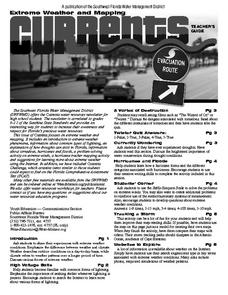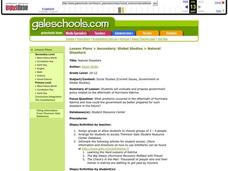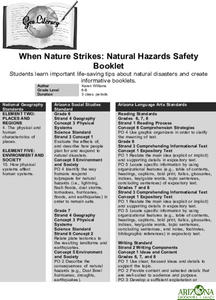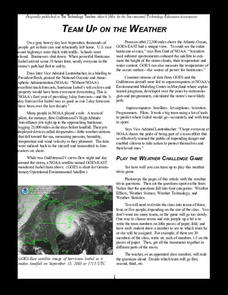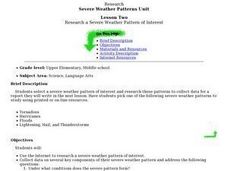Curated OER
Natural Disasters
Ninth graders write a description of a natural disaster. They list as many natural disasters as they can think of. The class discusses any natural disasters individuals have witnessed first hand. They watch a brief clip of a film that...
Center Science Education
Weather in the News
Tornadoes, blizzards, and hurricanes, oh my! In this activity, meteorology majors compare stories of historical storms written by two or more different sources. As a result, they understand how the media portrays such catastrophes and...
Curated OER
Do The Research! Forces of Nature
In this researching forces of nature worksheet, students read and record information about tornadoes, hurricanes, and the largest hailstones. Students write 3 short answers.
Curated OER
Extreme Weather and Mapping
In this environment worksheet, students read an article about extreme weather conditions and mapping it out. They respond to 10 multiple choice questions about what they read. Then, students explain how droughts can occur and the...
Curated OER
Winds of Destruction
Fourth graders discuss the problems that have arisen from the lastest string of hurricanes and tsuanamis. They watch a video about severe weather. After the film, 4th graders write four facts they found out about severe weather. ...
Curated OER
Science: Hurricanes As Heat Engines
Young scholars conduct Internet research to track the path of Hurricane Rita. They record the sea surface temperature of the Gulf of Mexico during and after the hurricane and draw conclusions about how hurricanes extract heat energy...
Curated OER
Natural Disasters
Students, in groups, research the problems that occurred in the aftermath of Hurricane Katrina and how the government could have been better prepared. They develop a useable plan for how the government could better prepare for such...
Curated OER
When Nature Strikes: Natural Hazards Safety
Students observe the impact of natural disasters on humans, and become aware of the dangers of environmental hazards such as flash floods, tornadoes, and hurricanes.
K12 Reader
Extreme Weather
Thunderstorms, tornados, blizzards, hurricanes. These extreme forms of weather are the focus of an article on a two-part reading comprehension worksheet. After reading the passage, kids use information in the text to respond to a series...
EngageNY
Building Background Knowledge and Making Inferences: What Is a Natural Disaster?
That's a disaster! Scholars complete a gallery walk to view images and make inferences about natural disasters. They fill out a note catcher about what they observe and infer any questions they may have. They then participate in a World...
Curated OER
Hunt For Supertwister
Students identify the best time of year and place to position spotters for possible tornado outbreaks. They research tornado formations, spotting, and safety. Students present their information using a poster, a mock-up of a newspaper,...
Curated OER
Twisters
Students build a tornado in a bottle and do various readings to explore tornadoes.
Curated OER
If I Was a...? Weather
In this hurricane facts worksheet, students pretend they are a hurricane. Students then answer five questions about their name, where they were born, which direction they rotate, how they differ from a tornado, and what their 'eye' is...
Curated OER
Weather Emergency Safety
Students identify different types of weather emergencies that may happen during the seasons. They list the steps involved when taking cover and fleeing dangerous weather patters. A comprehensive list of service agencies that can...
Curated OER
Dangerous Atmosphere
Students discuss dangerous weather. In this science lesson, students decide on which state they want to research and check the Internet for the dangerous weather in that state. Students determine which weather hazard was the most...
Curated OER
Severe Weather
Fifth graders identify the causes and effects of several different kinds of
severe weather phenomenon. They read an excerpt from John Muir's book The Mountains of California and research one of the following severe
weather phenomena...
Curated OER
Weather
For this weather worksheet, students write the letter of the definition that best matches the term or phrase. Students answer several short answer questions as it relates to the components of weather, severe weather, and air masses....
International Technology Education Association
Team Up on the Weather
There's a little bit about every aspect of weather in this trivia game. The lesson resource provides 36 questions and answers pertaining to four different topics related to weather: effects, science, technology, and statistics. Groups...
Curated OER
Research a Severe Weather Pattern of Interest
Students select a severe weather pattern of interest (tornadoes, hurricanes, floods, lightning, hail, and thunderstorms) and research these patterns to collect data for a report they write in the next lesson.
Curated OER
The Heat Is On!
Students research severe weather conditions common to their geographic location and create weather emergency guides. They, in groups, develop guides for extreme weather conditions such as heat waves, tornadoes, floods, and storms.
Curated OER
Dangerous Storms
Students examine media language for dangerous storms stressing; preparation, evacuation, and emergency assistance, and problem-solving techniques for emergency situations.
British Council
Weather 2
Young meteorologists answer questions based on the types of weather they experience in the region they live. They also complete a word search to find weather-related terms.
Radford University
Danger! – An Analysis of the Death Toll of Natural Disasters
Decipher the danger of natural disasters. Using researched data, scholars work in groups to create data displays on the number of deaths from different types of natural disasters. They share their graphical representations with the class...
Curated OER
Phenomenal Weather-Related Statistics
Eighth graders research, collect and interpret data about weather statistics. They record that data on spreadsheets. they create Powerpoint presentations on their individual or group research.





